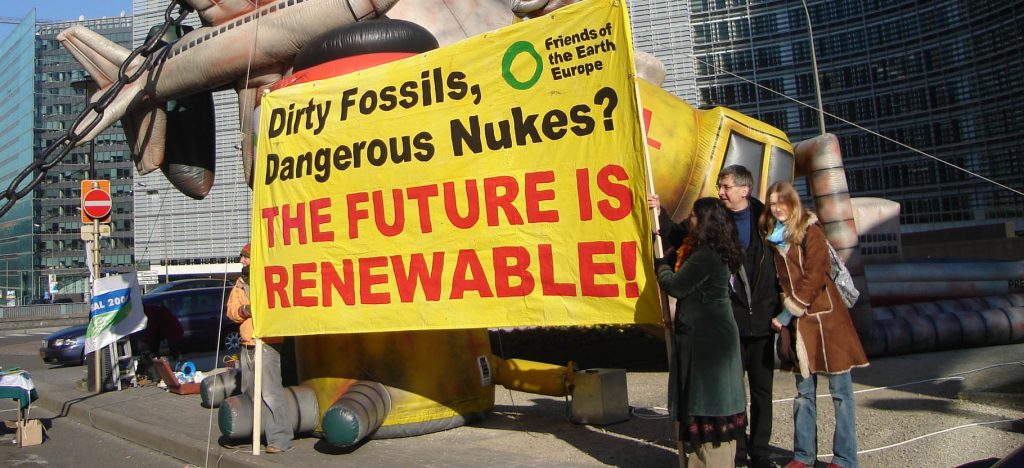Brussels, 29 April 2008 – Oil companies have the potential to achieve more than 10 per cent cuts in greenhouse gas emissions by 2020 without using agrofuels, reveals a report launched today by Friends of the Earth Europe. [1]
Released on the day Shell and BP announced combined quarterly profits of 14.4billion US dollars, [2] ‘Extracting the truth: Oil industry efforts to undermine the Fuel Quality Directive’ uses industry’s own data to show how oil companies are falsely claiming that the target proposed by the European Commission in revisions to the Fuel Quality Directive is unachievable. It shows that at least 10 per cent reductions in greenhouse gas emissions could be realised through reduced gas flaring, improved energy efficiency and fuel switching at refineries, and without the need for agrofuels which can have negative environmental and socials impacts and have not been proven to reduce emissions overall.
Darek Urbaniak, extractive industries campaigner for Friends of the Earth Europe said: “The oil industry is saying that it lacks the financial and technological resources to decrease its greenhouse gas emissions, but according to our research it has the potential to meet, and even exceed, the 10 per cent CO2 reduction target of the Directive. And this is without resorting to harmful agrofuels.
“The false statements being made by oil companies are blatant attempts to undermine the legislation. Instead of taking responsibility for its contribution to climate change, the oil industry is trying to wriggle out of its obligations.”
Friends of the Earth Europe’s report calculates that reductions in greenhouse gas emissions of between 10.5 per cent and 15.5 per cent are possible through measures including less flaring and venting, energy efficiency improvements and fuel switching in refineries. [3]
The report comes at a time of record profits for oil companies and increasing attempts to portray themselves as environmentally responsible. In 2007, ExxonMobil, Royal Dutch Shell, Chevron, TOTAL, BP and ENI together earned together over 125billion US dollars.
Paul de Clerck, corporates campaigner for Friends of the Earth Europe said: “Despite their sky-high profits oil companies are not willing to bear the costs of reducing emissions. It seems that since these investments are not profitable, companies will not make them unless they are forced by a regulatory body. The EU has to oblige companies to take the necessary steps. The report shows that it is possible and they have more than enough money to pay for it.”
The analysis released today puts oil industry attempts to obstruct the Fuel Quality Directive in the context of increased ‘greenwashing’. Behind the scenes oil companies are lobbying against environmental legislation whilst in public they use advertising to suggest that they are reducing emissions. In 2007 Shell was found guilty of misleading advertising for an advert in which it claimed it used waste CO2 to grow flowers.
Darek Urbaniak said: “Oil companies are not serious about their environmental performance. While they brand themselves as environmentally responsible, their CO2 emissions continue to rise. In reality the emissions of almost all of them are rapidly increasing and they are all investing heavily in energy-dirty tar sands, while their investments in renewable energy remain negligible or decrease.”
***
NOTES
[1] The full report ‘Extracting the truth: Oil industry attempts to undermine the Fuel Quality Directive’ can be found here.
[2] http://news.bbc.co.uk/2/hi/business/7372509.stm
[3] Potential for reaching the Article 7a target:
Less flaring and venting emissions: 8.5 per cent (based on available data / BAU); 8.5 per cent (estimated potential)
Ongoing energy efficiency improvements at oil refineries: 1 per cent (based on available data / BAU); 1 per cent (estimated potential)
Further efficiency improvements: 1 per cent (estimated potential) Fuel switching in refineries,UK estimate: 1 per cent (based on available data / BAU)
Fuel switching in refineries, other estimates: 2-5 per cent (estimated potential)
Total: 10.5 per cent (based on available data / BAU); 12.5-15.5 per cent (estimated potential)
The analysis is endorsed by a coalition of civil society organisations working on issues of environment and development:
Friends of the Earth Europe: www.foeeurope.org
Friends of the Earth England, Wales and Northern Ireland: www.foe.co.uk
Campagna per la Riforma della Banca Mondiale (Italy): www.crbm.org
Les Amis de la Terre (France): www.amisdelaterre.org
Milieudefensie: www.milieudefensie.nl
CEE Bankwatch Network (Central and Eastern Europe): www.bankwatch.org
BUND fur Umwelt und Naturschutz Deutschland: www.bund.net







